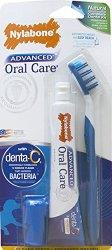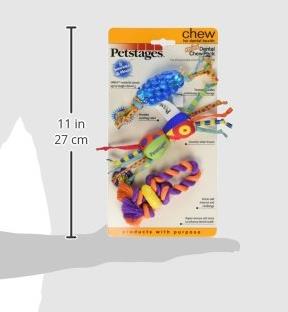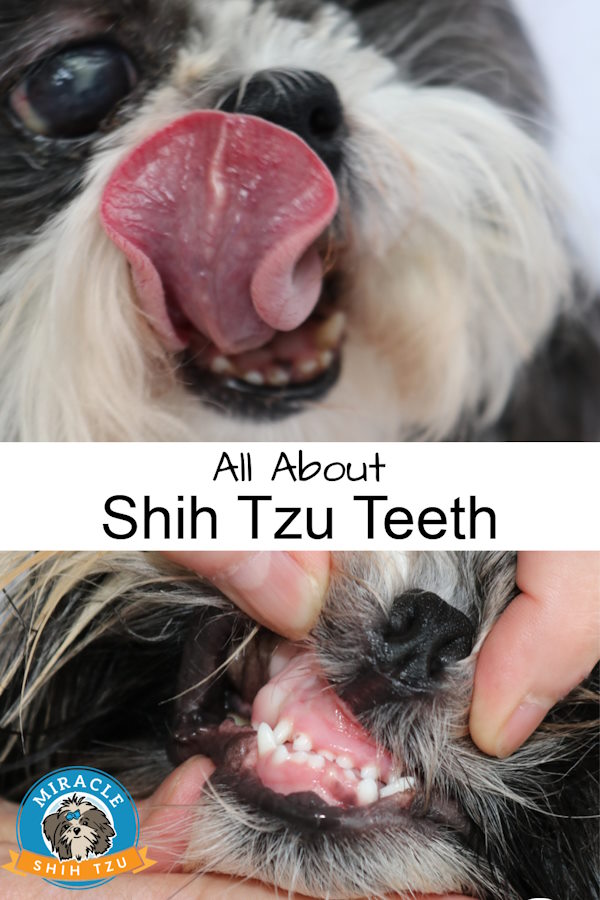Shih Tzu Teeth
by Janice Jones
Shih Tzu teeth need good dental hygiene not only to protect the teeth, but for your dog’s overall health.
Poor dental hygiene cannot only affect your dog’s teeth and mouth, but it can also extend to your dog’s vital organs.
The American Veterinary Dental Society reports that 80 percent of dogs show signs of oral disease by age three. If left alone, you will likely see some damage to your Shih Tzu's teeth before they turn 3.

Dental disease affects the whole body, too. Bacteria from these inflamed oral areas can enter the bloodstream and affect major body organs. The liver, kidneys, heart, and lungs are most commonly affected.
Antibiotics are used prior to and after a dental cleaning to prevent bacterial spread through the blood stream.
Plaque and Tarter on Shih Tzu Teeth
Some breeds are more prone to dental problems than others. Naturally a lot has to do with the dental care they've received from puppyhood. Shih Tzu dogs do seem to have their fair share of plaque and tarter build up.
There is a difference between plaque and tarter.
Plaque starts first and is that gummy film that forms on the teeth after a meal. It mixes with the bacteria in the mouth along with saliva and blood cells. After about 24 hours, it combines with the salts in the saliva and begins to harden. Eventually, it continues to accumulate and mix with the salts and turns into tarter.
Tarter, on the other hand, tarter occurs when plaque hardens and firmly sticks to the tooth, eventually wearing down the tissue around the tooth. Tarter is a problem for a couple of reasons.
The tarter sticks to the tooth providing a rough surface where bacteria can grow. The bacteria leads to inflammation of the gums which may result in bleeding. The swollen, red gums called gingivitis eventually leads to periodontal disease.
Tarter builds up near the gum, pushing the gums away from the roots of the tooth. As it continues, it can cause pain. The bacteria on the tarter does not remain confined to the mouth. It can be absorbed into the blood stream and travel to vital organs including the heart and the kidneys.
Shih Tzu Teeth: An Overview
Like us, dogs get two sets of teeth in their lives 28 baby or deciduous and 42 permanent or adult teeth. The first 28 baby teeth erupt through the gums between the ages of 3 and 6 weeks of age and feel like tiny sharp needles if they bite down onto your skin.
First the incisors appear around 3 weeks, then the canines and premolars. The last premolar to come in occurs around 8 to 12 weeks old. Puppies do not have to grind much food, so they do not have molars.
Puppy teeth begin to shed and be replaced by permanent adult teeth at about four months of age. Don’t worry if you don’t see these teeth, because the puppy often swallows them.
By the time a puppy is around 6 to 8 months old; their adult teeth erupt with the molars coming in last.
Beginning around the age of 5 or 6 weeks, the puppy goes through a difficult teething stage where anything is fair game, especially human fingers. They will chew on anything to relieve the discomfort and sometimes they even drool or lose their appetite.
| Tooth Eruption | ||
|---|---|---|
| Deciduous | Permanent | |
| Incisors | 4 - 6 weeks | 3 - 5 months |
| Canine | 5 - 6 weeks | 4 - 6 months |
| Premolars | 6 weeks | 4 - 5 months |
| Molars | 5 - 7 months | |
Retained Baby Shih Tzu Teeth
Sometimes a Shih Tzu puppy will not loose all of their deciduous teeth before the permanent teeth erupt. This is a common occurrence in the Shih Tzu breed. The baby teeth will eventually need to be removed by the veterinarian.
Normally a vet will check the puppy's teeth prior to a spay or neuter operation and remove them while the dog is under anesthesia. If you do not plan to spay or neuter your dog, you will want to make an appointment for a veterinary consultation. The vet may suggest that the baby tooth be removed.
A Lesson Learned The Hard Way
Do you know what puppy breath smells like? Sure you do if you've ever had a puppy. Fresh and clean, puppies mouths are easy to kiss, but not one of my puppies. This particular puppy had a foul smelling odor coming from her mouth, the same odor you might associate with a senior dog who is in desperate need of a dental cleaning.
This puppy was Cherry, the one you see in the header of this website. Here teeth were fine, but somehow a piece of hair had managed to curl itself around a canine tooth causing the tooth to decay. Luckily it was a baby tooth and the veterinarian was able to extract it during a routine office visit. Today her teeth are fine and her mouth smells fresh. But it just goes to show you that some of the strangest things can happen to our dog's teeth.
The Canine "Bite"
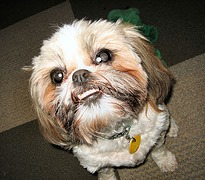 Shih Tzu Teeth: A Very Undershot Bite
Shih Tzu Teeth: A Very Undershot BiteIf you hear someone referring to the bite, they are referring to the way the teeth fit together when the upper and lower jaws close.
There are some differences in breed standards relating to the bite. There are several types of “bites.”
A “scissor bite” occurs when the upper incisors just slightly overlap and touch the lower incisors.
A “level bite” occurs when the incisors meet edge to edge. Overshot and undershot jaws are two common bite problems.
An overshot jaw is one in which the upper jaw is longer than the lower, causing the teeth to overlap and not touch.
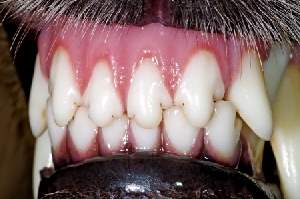 Slightly Undershot Jaw
Slightly Undershot JawAn undershot jaw is on in which the bottom jaw is longer than the upper jaw. Although this is generally a problem, it is the standard for the Shih Tzu breed and most other brachycephalic breeds. However, in the standard, the Shih Tzu should not have a tongue showing when the mouth is closed.The picture to the left represents a example of a good bite.
What About the Shih Tzu Teeth Bite?
According to the Standard, the Shih Tzu bite should be slightly undershot.
An overshot bite is considered to be a fault.
Shih Tzu Teeth should not show when mouth is closed.
Signs of Oral Disease in Shih Tzu Teeth
The following are signs that your dog may have a problem in his mouth or gastrointestinal system. If you notice any of these, consult your veterinarian.
- Bad breath
- Excessive drooling
- Inflamed gums
- Tumors in the gums
- Cysts under the tongue
- Loose teeth
One of the most common problems that Shih Tzu dogs (and others) encounter is periodontal disease (also called gum disease). If you have ever been diagonsed with gum disease, you will know that is a painful condition, caused by infection and infalmation. The problem can also include gingivitis, or inflamation of the gums, is a very common and painful condition, especially in pets. The term describes infection and inflammation in the tissues surrounding your pet’s teeth.
This dental issue includes gingivitis, which is the inflammation of the gums caused by bacteria that accumulate in a dog's mouth leading to plaque and tartar. It leads to bad breath, bleeding and swollen gums, often the dog will paw, shake, or scratch at the face. Gingivitis is the first stage of periodontal disease and is reversible. But if left untreated, it can progress to periodontitis.
The good news is that there preventative measures you can put into place to avoid costly dental bills.
There is no set age when any of these problems can occur in Shih Tzu teeth. Sometimes bad breath is the first thing we take note of and it is almost always a sign that something is wrong with the teeth.
How to Brush Shih Tzu Teeth
Do you have a puppy that is less than one year old? Please check out our page on Puppy Dental Care for more information specific to puppies. You can start caring for your puppy's teeth as soon as they come home. Puppies, however, must be trained to allow you to examine their mouth and brush their teeth. It is a slow process, but if done gently, you will end up with an adult Shih Tzu that doesn't mind having his teeth cleaned.
Do not use human toothpaste as it is likely to make your dog sick. Avoid human toothpaste because it has Xylitol, a sweetening agent that is toxic to dogs. Human pastes also have a foaming agent that is not necessary for our dogs.
A dog will swallow a lot of toothpaste while you brush so it is important to use toothpaste designed for dogs.
The canine toothpaste is usually acceptable to dogs because it comes in flavors that dogs prefer such as beef, chicken, liver and even mint. If you prefer, you can use baking soda, but dogs may not take to it as easily as commercially prepared canine toothpaste.
What You Need to Brush Your Dog's Teeth
A regular dog toothbrush can be used or a rubber finger brush that fits
over your index finger and has soft knobs that break apart tarter as you
rub your finger around the dog’s mouth.
A dog toothbrush is
smaller than a human has and has softer bristles.
You can also use a piece of gauze that you wrap around your finger or a dental wipe purchased for that purpose. Dental rinses are also available, but they rarely remove all the plaque.
You will need a good canine tooth brush and a canine toothpaste. Beyond that, you might be interested in a dental spray. The one pictured to the left is for adult dog teeth.
This kit includes the tooth brush, tooth paste, and a finger brush.
Alternatives to Toothbrushes When Caring for Shih Tzu Teeth
Again, if your dog does not like the toothbrush, you can still take care of his dental hygiene needs.
Some owners opt to scrap or scale their dog’s teeth themselves. If the dog is cooperative, this is a sure way to prevent disease and keep their pearly whites in great shape.
You can use a human plaque scraper that is available in any store with a dental health section or you can purchase one designed for dogs.
If you decide to do this yourself, have gauze or paper towels handy. As you scrape the tooth, catch any loose flakes of tarter from the scraper and the dog’s mouth. Do not allow your dog to swallow any loose tarter. If your dog protests this procedure, it is best to leave it to your vet. Dental plaque removers can be very sharp and a sudden jerk from an unhappy dog is likely to cut into the gums causing pain and even more resistance the next time you try to brush their teeth.
Nylabone Advanced Oral Care Dog Water Additive
Home Care for Shih Tzu Teeth
Daily brushing is the best thing that you can do to increase your dog’s dental health. In addition, you can still offer other things to your dog to assist you in the process.
To help control your dog’s bad breath, you can also offer them chew toys, such as the Nylabone Dental Dinosaur Chew, that massage their teeth and gums, removing sticky tartar and plaque.
Many dental toys are made of natural rope fibers that act as
floss, while other enticing dental toys offer a variety of interesting
textures, with ridges and grooves for the dogs to work on while his
teeth are maintaining their natural white glow.
I find that puppies enjoy these toys especially those that enjoy a gentle game of tug of war. I always let the puppy win and never jerk on the toy as this could cause some dental problems.
You can purchase this directly through Amazon and buying from the Miracle Shih Tzu Website helps us to keep this site up and running.
Chew bones especially designed edible dental chews also reduces tarter and helps freshen breath.
They generally come with no preservatives and are gluten-free to help with digestion.
Greenies are my favorite (pictured to the left) but there are other good ones on the market as well.
Finally, you can check with your veterinarian for food recommendations that assist with tarter control.
GREENIES Original Canine Dental Chews - Petite Size - Treat TUB-PAK Package (27 oz.) - 45 CountWhile dental care is not likely to be on your bucket list of fun activities with dogs, your diligence will pay off and potentially lengthen the lifespan of your dog, prevent unnecessary visits to the veterinarian, keep your dog's canine teeth clean and mouth smelling fresh, and help your dog live a long happy life.
Professional Care for Shih Tzu Teeth
If you notice any of these problems in your dog's teeth, it is very important to call and schedule a consultation with your veterinarian. If your dog has tarter on his teeth and showing signs of disease, he may need a professional cleaning in the veterinarian’s office.
Cleaning at a clinic is similar to that which we receive when we visit a dental hygienist to have our teeth cleaned with one major exception.
Dogs cannot talk and tell the veterinarian where it hurts, and they cannot sit in a chair willingly with their mouth open, canine patients must be anesthetized for the veterinarian to get a good look and do a proper job.
Dental X-rays may be done and scaling and polishing are done while the dog is monitored under anesthesia.
How often a dental cleaning is needed all depends on the dog. When you start to see tarter buildup that cannot be brushed away, it's time to call the vet. Depending on the dog's age, you may also need to have bloodwork done. Remember, sedation is necessary so that is why most vets require pre-op bloodwork.
As a rule of thumb, my dogs have required professional dental work anywhere between three and five years.
Professional Cleaning After Care
There is usually no long after care procedures to worry about, but here are a couple of suggestions given to me by my vet.
- Soft food for a couple of days especially after extractions
- Teeth brushing or cleaning with a gauze pad
- Call the vet if the dog does not resume eating or drinking.
Last Words
Like other canines, Shih Tzu dogs have two sets of teeth in their lives, 28 baby or deciduous and 42 permanent or adult teeth. They are born toothless, but begin to cut teeth around three weeks of age. Teething continues until all of their adult teeth have erupted. Between the time of the first teeth and the last adult tooth, puppies relieve teething pain by chewing on everything and even biting on you.
Unfortunately, Shih Tzu dogs do not have the best teeth in the universe, so they require extra TLC. From common problems such as retained baby teeth to tarter build up and periodontitis, few Shih Tzu can boost of perfect teeth for their lifetime. We can help our furbabies in a number of ways including regular teeth brushing, chew toys, dental treats and professional dentals.
Shih Tzu Teeth: Pin for Future Reference
"Hi, I'm Janice Jones, a former veterinary technician and Shih Tzu expert with over 40 years of experience with the breed. Through Miracle Shih Tzu, I combine my medical background and extensive breed knowledge to provide reliable, practical advice for Shih Tzu owners. My mission is to help you give your Shih Tzu the happiest, healthiest life possible through evidence-based information and real-world solutions. Whether you're new to the breed or a seasoned owner, you'll find trusted guidance here for all aspects of Shih Tzu care.
I hold an undergraduate degree in Psychology with a minor in biology, Early Childhood Education, and Nursing, and a Master's in Mental Health Counseling.
